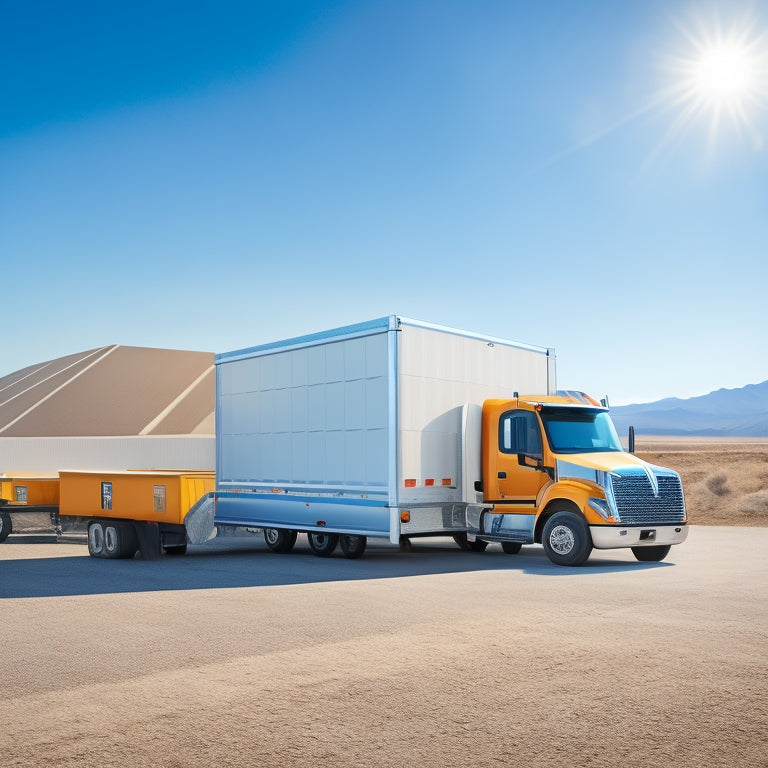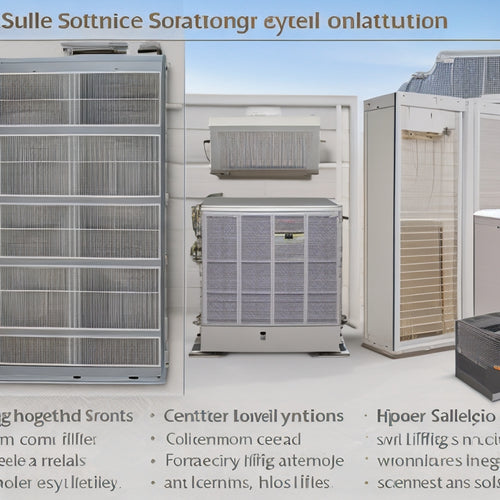
Installing Solar Panels on Commercial Trucks: A Guide
Share
As you consider outfitting your commercial truck with solar panels, you're likely driven by a desire to reduce operating expenses, shrink your carbon footprint, and improve fuel efficiency, all while powering critical auxiliary systems and ensuring a safe, reliable ride for drivers and cargo. To get started, you'll need to assess your energy needs, choose the right panels and mounts, and prepare your truck for installation. With the right guidance, you can navigate the installation process and enjoy the benefits of solar power. By following industry best practices and expert advice, you'll be well on your way to harnessing the power of the sun for a more sustainable future.
Key Takeaways
• Assess energy needs by conducting an energy audit to determine the total energy load and ensure the solar panel system can meet the demands.
• Choose high-efficiency solar panels with industry-standard certifications, considering factors like panel size, temperature coefficient, and durability.
• Select durable, weather-resistant mounting materials that prioritize structural reinforcement and waterproofing to secure the solar panels.
• Ensure proper installation by following manufacturer instructions, maintaining a clean workspace, and minimizing voltage drop with correct wire sizing and material.
• Establish a regular testing and maintenance schedule to optimize performance, conducting quarterly inspections and monitoring performance metrics like energy output and system voltage.
Benefits of Solar Panels on Trucks
By integrating solar panels on your commercial trucks, you can greatly reduce your fleet's carbon footprint and operating expenses. One of the most significant benefits of installing solar panels on your trucks is the improvement in fuel efficiency. Solar panels can power auxiliary systems, reducing the load on the engine and resulting in better fuel economy. This not only saves you money on fuel costs but also reduces your fleet's environmental impact.
With solar panels, you can reduce your reliance on fossil fuels and lower your greenhouse gas emissions. This can lead to significant cost savings and a reduction in your fleet's carbon footprint. Additionally, solar panels can also power safety features such as lights and alarms, ensuring your drivers and cargo are safe on the road.
Choosing the Right Solar Panel
When selecting the right solar panel for your commercial truck, you'll want to evaluate the panel's efficiency rating, as it directly impacts the amount of energy generated.
You'll also need to think about the mounting options, taking into account the unique constraints of a moving vehicle.
Panel Efficiency Ratings
Choosing the right solar panel for your commercial truck installation means evaluating panel efficiency ratings, which measure a panel's ability to convert sunlight into electrical energy. This rating is important in determining the amount of solar power your truck can generate.
When selecting a solar panel, you'll come across efficiency ratings ranging from 15% to 22%. A higher efficiency rating means more energy output per unit area.
Here are key factors to keep in mind when evaluating panel efficiency ratings:
-
Efficiency rating: Look for panels with high efficiency ratings (e.g., 20% or higher) for maximum energy output.
-
Panel size: Smaller, high-efficiency panels may be more suitable for commercial trucks with limited roof space.
-
Temperature coefficient: A lower temperature coefficient ensures your panel's efficiency remains high even in hot temperatures.
-
Durability: Assess the panel's durability and resistance to environmental stressors like hail, wind, and UV exposure.
-
Certifications: Make sure the panel meets industry standards and certifications, such as UL (Underwriters Laboratories) or IEC (International Electrotechnical Commission).
Mounting Options Considered
Your commercial truck's roof space and solar panel system design dictate the mounting options you'll consider, ultimately influencing the overall performance and durability of your solar installation. When choosing the right mounting option, you'll need to take into account the structural reinforcement requirements of your truck's roof. This is vital to guarantee the solar panels are securely fastened and can withstand various weather conditions.
You'll have two primary mounting options: fixed or adjustable. Fixed mounts are more common and provide a secure, low-profile installation. Adjustable mounts, on the other hand, allow for flexibility in panel angle and orientation, which can be advantageous for optimizing energy production.
Regardless of the mounting option you choose, it's crucial to ensure weather resistance. Look for mounts with a durable, rust-resistant coating and a waterproof seal to prevent water ingress.
When selecting a mounting system, prioritize structural reinforcement and weather resistance to secure a safe and efficient solar installation. This will ensure your solar panels operate at peak performance while enduring the rigors of the road.
Assessing Your Truck's Energy Needs
To accurately size a solar panel system for your commercial truck, you must first calculate your truck's total energy requirements, including the power needs of all onboard systems and appliances. This process is vital to guarantee your solar panel system can meet the energy demands of your truck.
Conducting an energy audit is an essential step in evaluating your truck's energy needs. This involves identifying and documenting the power requirements of all electrical components, including lights, refrigeration units, and communication devices. Load calculations are then used to determine the total energy load of your truck.
Some key factors to take into account when evaluating your truck's energy needs include:
-
Lighting systems: interior and exterior lighting, including headlights and brake lights
-
Refrigeration units: refrigerators, freezers, and other cooling systems
-
Communication devices: radios, GPS, and other communication equipment
-
HVAC systems: heating, ventilation, and air conditioning systems
-
Auxiliary power units: inverters, converters, and other power conversion equipment
Selecting the Best Solar Panel Mount
Now that you've calculated your truck's total energy requirements, it's time to focus on selecting a suitable solar panel mount that can securely hold your panels in place while withstanding the harsh conditions of the road.
When choosing a mount, consider the mounting materials used, as they play an important role in guaranteeing the structural integrity of the system. Look for mounts made from durable, weather-resistant materials such as anodized aluminum or stainless steel, which can withstand the constant vibration, wind, and water exposure. A sturdy mount will prevent your solar panels from shifting or detaching during transit, ensuring your safety on the road.
Additionally, consider the weight capacity and adjustability of the mount to ensure a secure fit for your specific solar panel configuration. By selecting a high-quality mount, you'll be confident that your solar panels will remain securely in place, even in the most demanding driving conditions.
Pre-Installation Preparation Checklist
Prior to installing solar panels on your commercial truck, make sure you've completed a thorough pre-installation preparation checklist to avoid costly mistakes or safety hazards. A well-planned installation guarantees a safe and efficient process.
Before you begin, make sure you've checked off the following essential items:
-
Conduct a thorough truck inspection: Ensure your truck is in good condition, with no signs of wear or damage that could affect the solar panel installation.
-
Plan for weather contingencies: Check the weather forecast and plan your installation accordingly to avoid working in hazardous conditions.
-
Gather necessary tools and materials: Double-check that you have all the required tools and materials to complete the installation efficiently.
-
Identify potential electrical system conflicts: Verify that your truck's electrical system can handle the added power output from the solar panels.
-
Designate a safe working area: Ensure a safe and clear workspace to minimize tripping hazards and electrical shock risks.
Installing Solar Panels on Trucks
With your truck prepared and all necessary tools and materials at hand, you're ready to mount the solar panels, starting with the attachment of the panel brackets to the truck's roof. Confirm the brackets are securely fastened, taking into account the truck's aerodynamics to minimize wind resistance and optimize energy harvesting. Consider consulting with your fleet management team to verify the installation meets their specifications and safety standards.
Carefully position the solar panels on the brackets, ensuring a snug fit and even spacing. Use a level to guarantee the panels are properly aligned, and secure them with the provided hardware. Be cautious when handling the panels to avoid damaging the electrical components or the truck's surface. Consider enlisting a second person to assist with the installation, especially when lifting or maneuvering the panels into place.
Throughout the installation process, maintain a clean and organized workspace to prevent tripping hazards and ensure efficient workflow. Remember to follow the manufacturer's instructions and local safety guidelines to guarantee a safe and successful installation.
Wiring and Electrical Connections
You'll need to connect the solar panels to the truck's electrical system, which demands meticulous planning and execution to guarantee a safe and efficient energy flow. This connection is critical, as it directly impacts the performance and longevity of your solar panel system.
To secure a seamless connection, consider the following essential factors:
-
Voltage Drop: Minimize voltage drop by using the correct wire size and material to reduce energy loss.
-
Wire Sizing: Correctly size your wires to handle the maximum power output of your solar panels, preventing overheating and electrical fires.
-
Cable Management: Organize cables neatly to prevent damage, tangling, and corrosion, ensuring easy maintenance and inspection.
-
Electrical Protection: Install surge protectors and fuses to safeguard your electrical system from power surges and short circuits.
-
Grounding and Bonding: Ensure proper grounding and bonding of the solar panel system to the truck's chassis to prevent electrical shocks and fires.
Testing and Maintenance Schedule
To guarantee your solar panel system operates at peak performance and longevity, establish a regular testing and maintenance schedule to monitor its efficiency and identify potential issues before they escalate.
This schedule should include quarterly inspections to make sure all electrical connections are secure, and solar panels are clean and free of debris. You'll also want to track performance metrics, such as energy output and system voltage, to identify any deviations from ideal levels.
Implementing a quality control process will help you detect and address any issues promptly, preventing minor problems from becoming major headaches. During each inspection, verify that all system components are functioning within specified parameters, and perform any necessary adjustments or repairs.
Troubleshooting Common Issues
When you're dealing with solar panels on your commercial truck, you'll inevitably encounter issues that need to be addressed.
To get your system up and running smoothly again, you'll need to identify the root cause of the problem, whether it's a panel malfunction or an electrical system failure.
Panel Malfunction Diagnosis
By monitoring your solar panel system's performance data, you can quickly identify potential issues and troubleshoot common problems that may be reducing energy output. This proactive approach allows you to perform fault analysis and error detection, guaranteeing your system operates at peak levels.
When diagnosing panel malfunctions, it's crucial to follow a structured approach to identify the root cause of the issue.
Here are some common issues to look out for:
-
Low voltage: Check for loose connections or damaged cables that may be causing a voltage drop.
-
High temperature: Ensure proper cooling and ventilation around the panels to prevent overheating.
-
Shading: Identify any obstacles or debris that may be casting shadows on the panels.
-
Inverter issues: Check the inverter's display for error codes or fault messages.
-
Dirty panels: Regularly clean the panels to maintain optimal energy output.
Electrical System Failures
Electrical system failures can bring your entire solar panel system to a grinding halt, and pinpointing the root cause of the issue is essential to getting back up and running efficiently.
As you troubleshoot, remember that battery failure modes can be particularly tricky to identify. A faulty battery can manifest in various ways, such as reduced capacity, voltage drops, or complete system shutdown. When you're dealing with electrical system failures, it's vital to rule out battery-related issues first.
Next, inspect your electrical surge protection devices to make sure they're functioning correctly. A malfunctioning surge protector can lead to electrical shocks, fires, or damage to your solar panel system. Verify that your surge protectors are rated for the voltage and current requirements of your system.
Additionally, check the wiring and connections for signs of wear, corrosion, or damage. By methodically eliminating potential causes, you'll be able to identify and rectify the root cause of the electrical system failure, getting your solar panel system back online quickly and safely.
Optimizing Solar Panel Performance
Your solar panel's performance is significantly impacted by the cleanliness of its surface, as dirt and debris can reduce energy output by up to 25%. To maximize energy harvesting, it's important to maintain a clean panel surface. Regular panel cleaning is vital, especially for commercial trucks that travel through various environments, accumulating dirt and grime.
Here are some tips to optimize your solar panel's performance:
-
Clean the panels every 2-3 months, or more frequently if you drive in dusty or polluted areas.
-
Use a soft-bristled brush and mild soap to avoid scratching the panels.
-
Avoid using harsh chemicals or abrasive materials that can damage the panels.
-
Inspect the panels regularly for signs of wear, damage, or debris accumulation.
-
Consider investing in an automated panel cleaning system for convenience and efficiency.
Frequently Asked Questions
Can Solar Panels Be Installed on Refrigerated Trucks and Trailers?
You're wondering if solar panels can be installed on refrigerated trucks and trailers. Yes, they can, but it's important to take into account the refrigeration loads and temperature control systems to guarantee the solar panels don't compromise the cargo's safety and quality.
Are There Any Solar Panel Options for Trucks With Curved Roofs?
You're wondering if solar panels can fit on trucks with curved roofs. Think of a surfer adapting to a wave's curve; flexible solar panels can conform to a curved roof, providing a snug, efficient fit, ensuring a safe and reliable energy source.
How Do Solar Panels Affect a Truck's Center of Gravity?
You'll need to take into account how solar panels affect your truck's center of gravity, as added weight on the roof can alter weight distribution, raise stability concerns, and increase roof loading, impacting overall safety.
Can I Install Solar Panels on a Leased Truck or Trailer?
'Ah, you're thinking of going green on someone else's wheels? Hold up, buddy! Check your lease agreement for restrictions on modifications, and don't forget to take into account insurance implications - you don't want to void your contract or compromise coverage.'
Do Solar Panels Void a Truck's Warranty or Certification?
'When adding solar panels to your truck, you'll want to make sure they won't void the warranty or certification. Check with the manufacturer for approval, as unauthorized modifications can raise warranty concerns and compromise safety certifications.'
Related Posts
-

Why Solar HVAC Filters Revolutionize Home Energy Efficiency
By adopting solar HVAC filters, you're shifting your home's energy reliance from fossil fuels to clean, renewable sou...
-

3 Green HVAC Filters for Solar-Powered Homes
When outfitting your solar-powered home with an HVAC system, you'll want to choose filters that align with your commi...
-

Green Deck Options: Earth-Conscious Choices for Your Home
You're looking for a deck that not only enhances your home's exterior but also aligns with your eco-friendly values. ...


